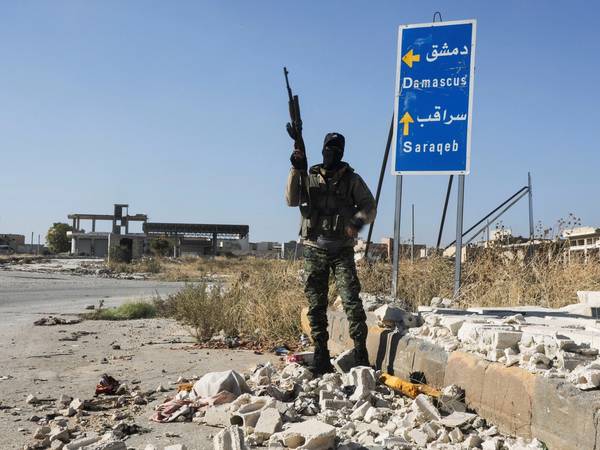Syria’s second largest city Aleppo fell to rebel forces within a mere 48 hours of their launching a shock offensive. Now they push forward on the road to Damascus.
The hardline Islamist-led forces are unlikely beneficiaries of fallout from neighboring conflicts in which key Syrian allies Iran and Russia are sapped and distracted while uneasy neighbor Turkey presses its advantage.
Syrian president Bashar al-Assad, accused of war crimes by many Syrians and rights groups, fended off an armed challenge to his rule following Arab Spring democracy protests in 2011 with help from Iran-backed Hezbollah fighters and Russian air power.
But much has changed. The war in Ukraine has preoccupied Russia, Hezbollah limped to a ceasefire with Israel and Iran finds itself on the backfoot in a multifront confrontation with Israel in which it has lost the initiative.
“Over the last year, Hezbollah's forces inside Syria got weaker,” said Ibrahim Al-Assil, a Syrian analyst at the Middle East Institute in Washington, D.C.
Al-Assil said he was detained by the Syrian secret police in 2011 while taking part in a peaceful protest against Assad in Damascus. He said he was interrogated and tortured for four days at a Syrian military Airport.
“Now even Russia is overwhelmed and busy with the war in Ukraine,” said Al-Assil who founded the Syrian Nonviolence Movement but now predicts deadly upheaval. “The battle is not going to be easy. It's going to be bloody. It's going to be brutal."
The Israeli military has launched dozens of strikes on alleged Iran weapons facilities, smuggling routes and warehouses, curbing the ability of Iran and its allies to help.
The Israeli military announced on Tuesday in a new release that their Air Force conducted a strike in Damascus targeting Hezbollah’s representative to the Syrian military, Salman Nemer Jamaa.
Israel said Jamaa was a Hezbollah operative who was a key figure in enabling weapons smuggling to Lebanon from Syria, in a sign the Jewish state would still pound its Lebanese adversary despite the calm next door.
How far can Iran go to support Assad?
Whether Iran in its cash-strapped and weakened state can afford to come to Assad's rescue remains a key question.
“Is Syria the hill the Iranian regime is willing to die on? I don't think so,” said Hazem Alghabra, who grew up mostly in Syria was a former advisor to the US State Department on Near Eastern Affairs.
The Iranian establishment may understand its weakened position, and Hezbollah forces could be demoralized and underequipped after a punishing 14-month wrestle with the Mideast's top military power.
“The Iranian regime is not going to make big decisions while they're being chased literally by Israel and the United States. The Iranian regime moves when there's an opportunity, a weakness," Alghabra said. "They operate a bit like a virus, whenever they see a weakened immune system, they move in it."
Who are the rebel forces?
Two of the main rebel forces, Hayat Tahrir al-Sham (HTS) and the Syrian National Army (SNA), are both backed by Ankara.
HTS, known as the Organization for the Liberation of the Levant, is a former Al Qaeda affiliate that pledges to build a state based on Islamic principles.
They are made up Islamist insurgents with Jihadi ideology and former Free Syrian Army factions. They managed to take control of key places in Syria such defense factories in Aleppo, a thermal power station and an air base, according to monitors and eyewitnesses.
All met with little resistance, Greg Brew, an Iran analyst with the Eurasia Group told Iran International.
“Assad's forces have essentially melted away,” said Brew. “Turkey is largely in the driver's seat when it comes to extracting real concessions and real advantage from the situation."
Ankara, while supporting anti-government rebels, may not want Assad to fall, however.
Turkish President Recep Tayyip Erdogan may be using the Islamist insurgents to push a reluctant Assad to acquiesce to a Turkish sphere of influence in Northern Syria, allowing the millions of Syrian refugees in Turkey to return.
Weakened Syrian control over the area may aid Turkey's goal of undermining Kurdish foes further to the East who could also soon find the US military umbrella under which they have operated for years yanked away by an isolationist President Trump.
“Turkey is in a position to extract the greatest gains, the greatest advantage from this sequence of events, even if it hasn't been dictating the events, it does look likely to benefit,” said Brew.
On Tuesday, US airstrikes hit the Eastern Syria in the city of Deir Ezzor. The day before, US backed anti-Assad forces took several villages there from Iran and Iran-backed Assad forces.
While regional power politics may mean Israel and Turkey do not seek Assad's outright ouster, Syrian people trapped in the conflict are at the mercy of the country's clashing internal foes.
Syrian's suffered under the human rights abuses of their president but are likely wary of the Islamist insurgents who have pushed out his forces in recent days.
"People now are focusing on survival," said Al-Assil.
